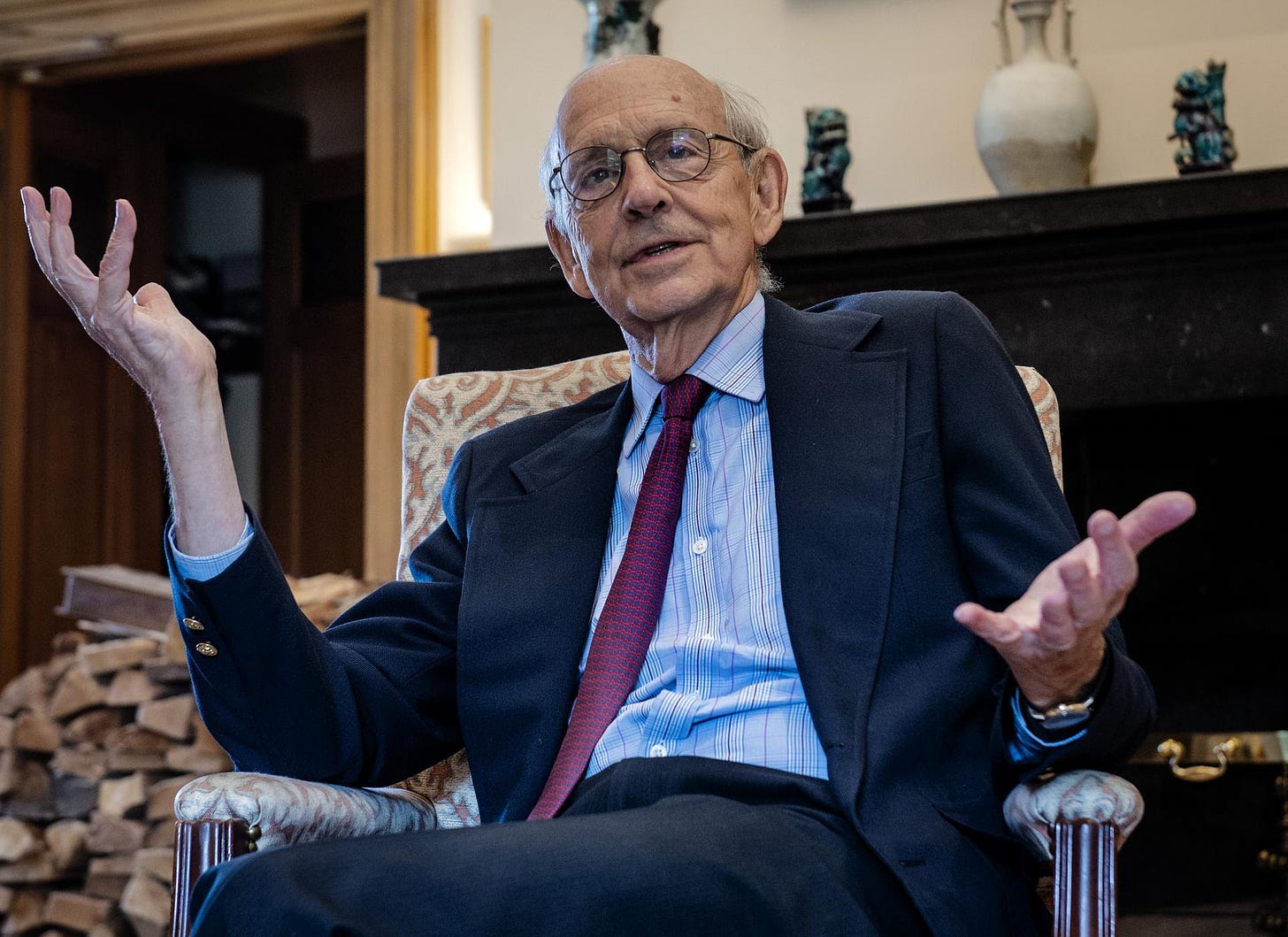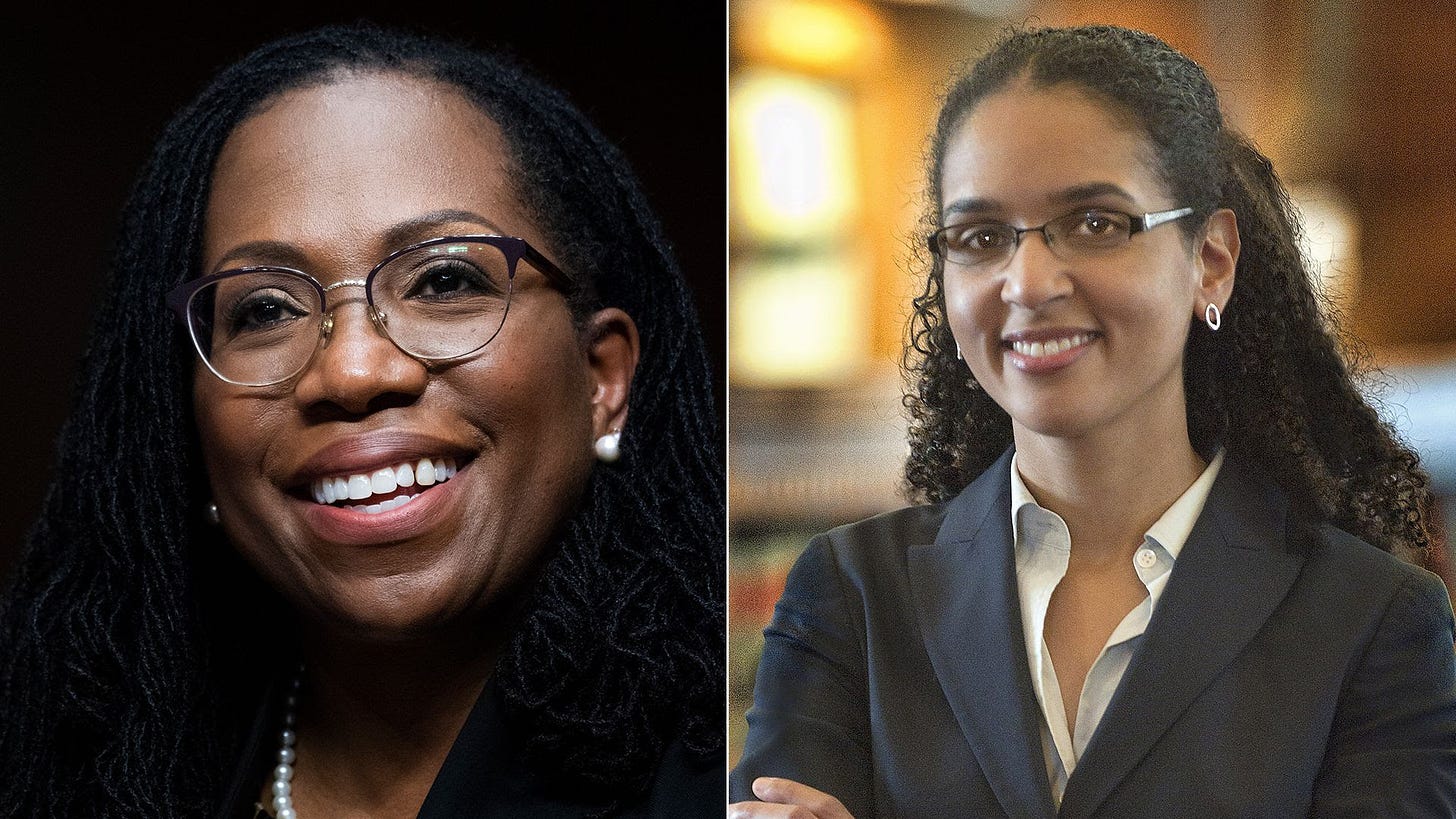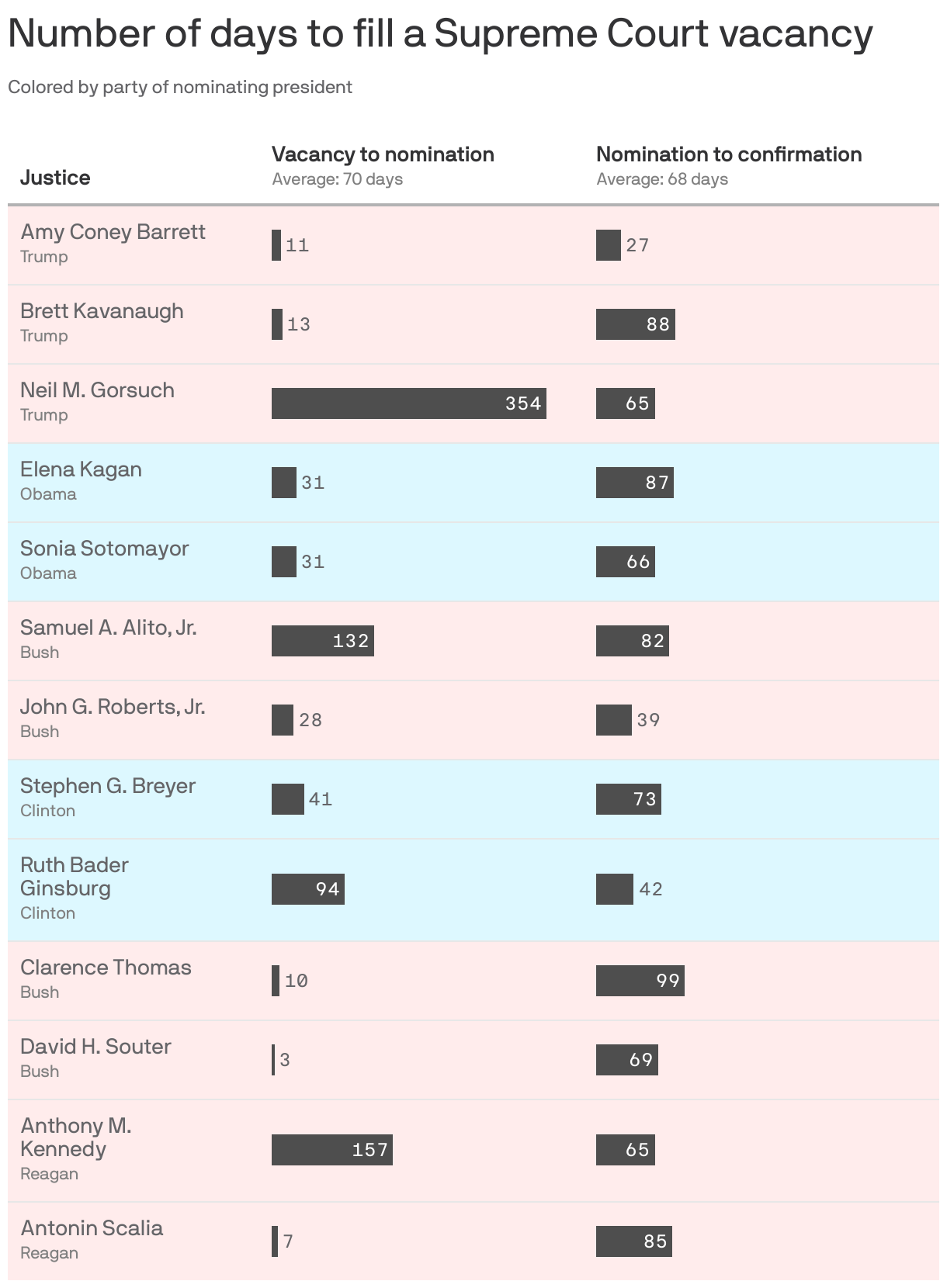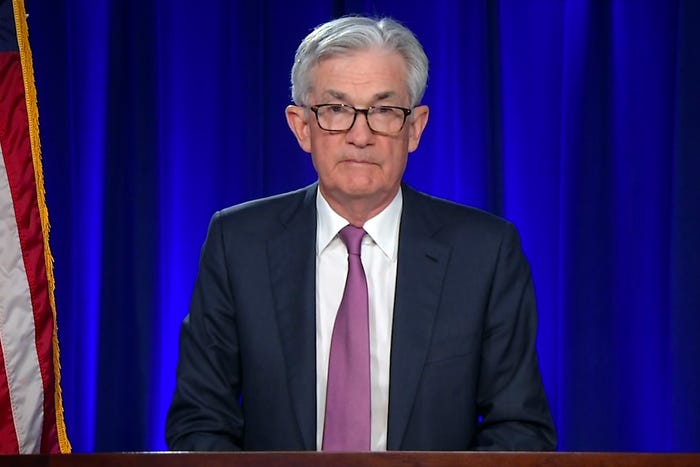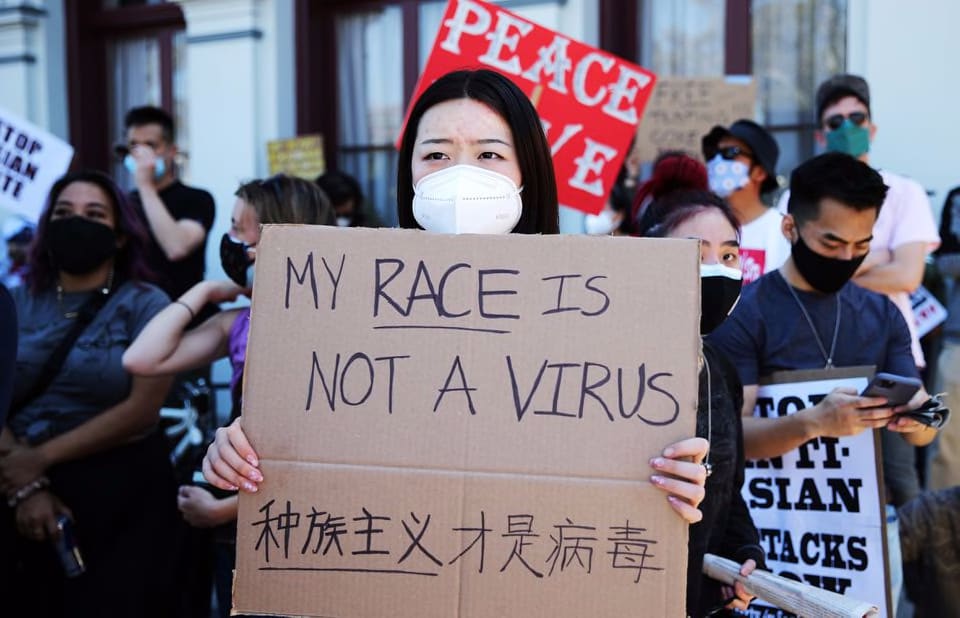The Full Belmonte, 1/27/2022
Justice Stephen Breyer to retire from Supreme Court, giving Biden a chance to nominate
Bill O’Leary/The Washington Post via Getty Images
“Supreme Court Justice Stephen Breyer, 83, will retire from the nation’s highest court at the end of the court’s present term, which terminates in June. Breyer is one of the three remaining liberal justices, and his retirement will give President Joe Biden the opportunity to appoint a justice.” [Vox] Read more at Washington Post / Robert Barnes
“Concern about Breyer’s retirement plans became acute after the 2020 death of Justice Ruth Bader Ginsburg. She died while Donald Trump was in office, allowing for the confirmation of Justice Amy Coney Barrett, whose deep conservatism will shape the Court for decades to come.” [Vox] Read more at WSJ / Jess Bravin
“‘He was very concerned about public perception of the court,’ Alicia Bannon, director of the Brennan Center for Justice’s Judiciary Program, told Vox in a phone interview. The court’s shadow docket, its unwillingness to adopt a code of conduct, the number of constitutional rights at risk, all reduced public confidence in the court. This troubled Breyer, Bannon said.” [Vox]
“Biden is expected to formally announce the retirement on Thursday. During his campaign, Biden promised to nominate a Black woman to a Supreme Court seat should one become vacant — he’ll have to move quickly to ensure his nominee is confirmed while Democrats still have a majority in Congress.” [Vox] Read more at NYT / Adam Liptak
“Republicans tend to pick Supreme Court Justices from the Federalist Society to ensure ideological coherence; Democrats don’t have a similar pool from which to draw. ‘Democrats are more interested in the work background’ than in ideology, Anna O. Law, Herbert Kurz Chair of Constitutional Rights at CUNY Brooklyn College, told Vox in a phone interview.” [Vox]
“While Biden’s pick won’t change the balance of the court, their input on dissents will be crucial, Law said. ‘The dissenters are writing for history, they are signaling to interest groups ... about how to approach the court; they’re inviting cases. It’s playing the long game,’ she said.” [Vox]
Judge Ketanji Brown Jackson (left) and Justice Leondra Kruger. Photos: Tom Williams via Getty Images and Lonnie Tague, Justice Department
“First there was RBG. Then (in some circles) ACB. Next up, with Justice Stephen Breyer retiring: watch KBJ.
That stands for Ketanji Brown Jackson, a judge on the D.C. Circuit Court of Appeals who's frequently mentioned to replace Breyer, reports Axios Supreme Court watcher Sam Baker.
Another name getting buzz is Leondra Kruger, a justice on the California Supreme Court.
Breyer, 83, is expected to announce he'll wait to retire officially until his successor is confirmed.
There's precedent for this: The late Justice Sandra Day O'Connor waited to retire until current Justice Samuel Alito was confirmed.
Zoom in: President Biden has promised to nominate the first Black woman justice.
Jackson is a powerful federal judge with a record that progressives feel they can trust. Kruger was a highly regarded litigator and has carved out a reputation for working well with conservative judges.
Every current Senate Democrat voted to confirm Jackson to the powerful D.C. circuit just last summer. So it'd be hard for them to oppose her now.
Kruger has a reputation on the California Supreme Court as moderate and incrementalist, the L.A. Times reports. She served in the Justice Department during the Obama administration.” Read more at Axios
Data: Axios research, Supreme Court Historical Society. Chart: Jacque Schrag/Axios
“President Biden has 286 days before the midterms, giving the Senate plenty of time to get a nomination through.” Read more at Axios
“WASHINGTON — Senate Democrats say they plan to move speedily to consider President Biden’s nominee for the Supreme Court vacancy created by the retirement of Justice Stephen G. Breyer, following the lead of Republicans who raced through the nomination of Justice Amy Coney Barrett in a matter of weeks before the 2020 elections.
Holding a bare 50-seat majority that is under severe threat in November’s midterm elections, Democrats acknowledged the need to act fast, particularly since an illness or death of one of their members could deprive them of their numerical advantage and greatly complicate efforts to fill the seat.
‘President Biden’s nominee will receive a prompt hearing in the Senate Judiciary Committee, and will be considered and confirmed by the full United States Senate with all deliberate speed,’ Senator Chuck Schumer, Democrat of New York and the majority leader, said on Wednesday after plans for Justice Breyer’s departure became public.
Democrats could confirm a successor to Justice Breyer without any Republican support under Senate rules that shield a Supreme Court nomination from a filibuster, but they must remain firmly united to do so.” Read more at New York Times
“MOSCOW — The United States and NATO on Wednesday delivered written responses to the Kremlin’s demands for security guarantees that would curtail the military alliance’s further expansion and activities in Eastern Europe, as tensions continued to escalate over Russia’s buildup along its borders with Ukraine.
The responses, which NATO sent to the Russian embassy in Brussels and U.S. Ambassador to Russia John J. Sullivan hand-delivered to Russia’s Ministry of Foreign Affairs, set ‘out a serious diplomatic path forward, should Russia choose it,’ Secretary of State Antony Blinken told reporters. Both he and NATO Secretary General Jens Stoltenberg said their responses — which Moscow had demanded be put in writing — were coordinated with Ukraine and each other and strongly affirmed NATO’s commitment to an open-door policy for nations that want to join.
‘NATO’s door is open, remains open, and that is our commitment,’ Blinken said, rejecting Moscow’s demand that Ukraine, Georgia and other countries in the post-Soviet space be permanently barred from joining the alliance.” Read more at Washington Post
“(CNN)The US and a handful of allies are in discussions to deploy thousands more troops to Eastern European NATO countries before any potential Russian invasion of Ukraine as a show of support in the face of Moscow's ongoing aggression, three US officials familiar with the discussions tell CNN.
Among the countries considering accepting the deployments are Romania, Bulgaria, and Hungary. The deployments would number approximately 1,000 personnel to each country and would be similar to the forward battle groups currently stationed in the Baltic States and Poland.
The US and UK are among those considering the new, pre-invasion deployments, but not all 30 NATO members are willing, according to a European diplomat.
NATO allies have not been entirely on the same page about the severity of the threat, and Germany, for example, has refused to sell new weaponry to Ukraine. Therefore, the US is in discussions to send the additional forces on a bilateral basis or, as one official described it, as a ‘coalition of the willing.’” Read more at CNN
“The Kremlin offered a scathing response Wednesday after President Joe Biden threatened to level sanctions on Vladimir Putin personally if the country invades Ukraine. Dmitry Peskov, the Russian leader’s spokesman, told reporters any sanctions against Putin and the top leadership of the country would be ‘politically destructive’ but ‘not painful.’ He accused U.S. lawmakers who drafted the potential sanctions of ignorance on Russian matters. ‘U.S. congressmen and senators who do not understand this topic talk about freezing assets, bank accounts, real estate, and so on, but this, apparently, is due to the fact that they do not have sufficient expertise and they are not asking those who professionally specialize in Russia.’ His comments came as leaders from France, Germany, Russia, and Ukraine gathered in Paris for four-way talks. Russian Foreign Minister Sergei Lavrov, meanwhile, doubled down on the saber-rattling as the country held new military drills, vowing to take action against any ‘aggressive’ moves by the U.S. or its European partners.” [Daily Beast] Read more at Reuters
“While the United States awaits Russia’s response, the prospects for a resolution to Ukraine’s war with pro-Russian separatists have become brighter following Wednesday’s Normandy Format talks in Paris. Russian official Dmitry Kozak said the meeting had re-confirmed a cease-fire and that four-way talks would continue in two weeks to talk through interpretations of the Minsk accords.” Read more at Foreign Policy
Fed Chairman Jerome Powell says ‘this outlook is quite uncertain, and we’re going to have to adapt’ at his Wednesday news conference.
PHOTO: FEDERAL RESERVE
“The Federal Reserve held short-term interest rates steady today, but signaled plans to raise them in mid-March. That intention is the strongest sign yet that the Fed is moving toward removing stimulus to bring down inflation. Inflation, which erodes most people's purchasing power, hit 7% in December, its fastest pace in close to 40 years.” Read more at Wall Street Journal
“After a frenetic few weeks when the Omicron variant of the coronavirus seemed to infect everyone, including the vaccinated and boosted, the United States is finally seeing encouraging signs.
As cases decline in some parts of the country, many have begun to hope that this surge is the last big battle with the virus — that because of its unique characteristics, the Omicron variant will usher Americans out of the pandemic.
The variant spiked in South Africa and Britain, then fell off quickly. Twitter is agog over charts showing declining virus levels in sewage in Boston and San Francisco. On Monday, the top European regional official of the World Health Organization suggested that ‘Omicron offers plausible hope for stabilization and normalization.’
‘Things are looking good,’ Dr. Anthony S. Fauci, the Biden administration’s top adviser on the pandemic, said on Sunday. ‘We don’t want to get overconfident, but they look like they’re going in the right direction right now.’
What’s driving the optimism? The idea is that so many people are gaining immunity through vaccination or infection with Omicron that soon the coronavirus will be unable to find a foothold in our communities, and will disappear from our lives.
But in interviews with more than a dozen epidemiologists, immunologists and evolutionary biologists, the course of the virus in the United States appeared more complicated — and a bit less rosy.
By infecting so many people, Omicron undoubtedly brings us closer to the end of the pandemic, they said. The current surge in infections is falling back, and there is reason to hope that hospitalizations and deaths will follow.
The path to normalcy may be short and direct, the goal just weeks away, and horrific surges may become a thing of the past. Or it may be long and bumpy, pockmarked with outbreaks over the coming months to years as the virus continues to find footing.
In any case, it is not likely that the coronavirus will ever completely disappear, many scientists said, and herd immunity is now just a dream. The population’s immunity against the virus will be imperfect, for a variety of reasons.
‘Maybe there was a short while where we could have reached that goal,’ said Shweta Bansal, an infectious disease modeler at Georgetown University. ‘But at this point, we are well beyond that.’
Instead, the coronavirus seems likely to become endemic — a permanent part of American lives, a milder illness, like the flu, that people must learn to live with and manage.
But the future also depends on a wild card: new variants. Omicron surfaced only at the end of November. Most researchers believe other variants are coming, because too little of the world is vaccinated. Eventually some may be both highly contagious and have a knack for short-circuiting the body’s immune defenses, lengthening the misery for everyone.” Read more at New York Times
“The Biden administration has canceled two leases near Minnesota’s Boundary Waters Canoe Area Wilderness — a remote, lake-pocked region at the center of a blistering fight over whether to mine near one of the nation’s most popular wilderness destinations.
On Wednesday, the Interior Department said it found that the leases to extract copper, nickel and other valuable hardrock minerals in northern Minnesota were improperly renewed under Donald Trump. The Biden administration’s decision will help protect the hundreds of lakes, streams and wetlands in the 1.1 million-acre wilderness area hugging the Canadian border from the potential toxic leaching from mining.
‘The Department of the Interior takes seriously our obligations to steward public lands and waters on behalf of all Americans,’ Interior Secretary Deb Haaland said in a statement. ‘We must be consistent in how we apply lease terms to ensure that no lessee receives special treatment.’
In fast-warming Minnesota, scientists are trying to plant the forests of the future
Each year, Boundary Waters attracts roughly 150,000 Boy Scouts and others visitors looking to canoe, fish and connect with nature. The glaciers that gouged the region over the past 2 million years left behind a rugged terrain that today is home to wolves, moose, bobcats, beavers, bald eagles and peregrine falcons.” Read more at Washington Post
“WASHINGTON—Federal regulators proposed measures that would significantly increase their visibility into private-equity funds and some hedge funds, the first in a range of plans to expand oversight of private markets.
The Securities and Exchange Commission voted 3-1 to issue a proposal that would increase the amount and timeliness of confidential information that private-equity and hedge funds report to the agency on a document known as Form PF.
The main goal, Chairman Gary Gensler said, is to allow regulators to better spot risks building up in private markets, stepping up an effort that began after the 2008 financial crisis.
The commission, in a meeting Wednesday, also voted 3-1 to propose expanding oversight of some trading platforms that match buyers and sellers of U.S. Treasury securities. The agency will seek comment on the proposals before completing the rules, a process that could take several months at least.
Hester Peirce, the commission’s only Republican, voted against both proposals. She questioned the need for increased disclosures from private funds and dissented from the trading-platforms rule because she said the 30-day comment period is too short.
Net assets managed by private funds, which are accessible only to institutional investors or relatively wealthy people, rose to $11.7 trillion in the first quarter of last year from $5.3 trillion in 2013, SEC data show.
With the growth have come concerns from some policy makers about the potential for unseen risks to accumulate in a corner of the market that is far less transparent than mutual funds or publicly traded companies.” Read more at Wall Street Journal
“San Francisco officials pledged to better protect Asian Americans and Pacific Islanders as preliminary data from the city’s police department showed the number of people who reported being the victim of an anti-AAPI hate crime in the city last year increased by 567 percent compared with the previous year.
There were eight anti-AAPI hate crimes reported to the San Francisco Police in 2019 and nine in 2020. In 2021, there were 60. These numbers are considered preliminary until the California Department of Justice makes its final determination on hate crime statistics throughout the state, police said.
San Francisco’s police chief, Bill Scott, said at a Tuesday news conference that one man was believed to be responsible for half of the incidents reported last year. Scott said the man, who was not named, was arrested in August and could face enhanced hate crime charges.” Read more at Boston Globe
“Some at-home Covid-19 test kits can pose accessibility issues to people with vision or manual-dexterity problems. Advocates for people with disabilities say using color contrast to convey information poses challenges for the colorblind and the lack of online audio or video instructions online make it impossible for blind or visually-impaired people.” Read more at Wall Street Journal
“About a week after announcing his executive order making masks optional in schools throughout Virginia, Gov. Glenn Youngkin (R) said on a radio show that school districts statewide had rushed to comply.
‘The reality is it’s about 25 out of our 130 school systems across Virginia who aren’t recognizing the rights of parents today,’ Youngkin told conservative host John Fredericks on Monday, adding that the noncompliant districts were prioritizing ‘bureaucrats and politicians over the rights of parents.’
But a Washington Post analysis shows that the majority of Virginia public school districts — enrolling more than two-thirds of the state’s students — have opted to disobey Youngkin’s mask-optional order. As of Wednesday, two days after the order was supposed to take effect, 69 districts, or 53 percent, are still requiring masks for all students inside schools. Cumulatively, those districts enroll 846,483 students, or about 67 percent of the state’s public school student population. The divide falls along partisan lines, although not perfectly: Almost every district that opted to make masks optional is in a locality that voted for Youngkin in the 2021 gubernatorial election.” Read more at Washington Post
“For the first time, outsiders are joining the Bill & Melinda Gates Foundation board of trustees.
The four new members come aboard this week. Bill Gates and Melinda French Gates co-founded the charity, which has an endowment of more than $50 billion; they remained co-chairs after they got divorced last year. The previous other trustees were Bill Gates Sr., who died two years ago, and Warren Buffett, who resigned in June. The foundation was established 21 years ago.” Read more at Wall Street Journal
“Amazon is channeling its influence in Washington to drum up bipartisan support for an unlikely cause: legalizing marijuana.
The company on Tuesday endorsed legislation by Rep. Nancy Mace (R-S.C.) to end the federal prohibition on pot, as Forbers reported, the first time it has backed a GOP-led bill on the issue. In doing so, Amazon is dialing up an unexpected campaign that if successful could make it easier for the e-commerce giant to expand its workforce as it continues a big hiring surge.
The tech giant came out in favor of legalization efforts last year and has since lobbied both publicly and privately for other, Democratic-led proposals that like Mace’s would remove marijuana from the federal government’s list of controlled substances. (Jeff Bezos, who founded Amazon, owns The Washington Post.)
Now the tech giant is again flexing its political might to rally lawmakers behind the cause, which Amazon says could widen its applicant pool by helping to ease drug testing requirements and assist with employee retention.
‘This is not an issue that Amazon would normally engage on,’ Brian Huseman, Amazon’s vice president of public policy, told me during an interview Tuesday.
Legalizing pot could also open the door to a lucrative new market for the online retailer. But Huseman said Amazon is not interested in selling pot.
‘There are no plans to sell cannabis and that is not why we’re doing this or being involved in this debate,’ he said.
Instead, he said, their focus in pushing for legislation is to remove hiring impediments, which Amazon has found disproportionately impact individuals of color. ‘We realized that it was a hindrance to our ability to hire employees,’ he said.
That includes endorsing two bills led separately by Senate Majority Leader Chuck Schumer (D-N.Y.) and by Rep. Jerry Nadler (D-N.Y.) that each would also expunge some marijuana-related crimes, in addition to removing the federal prohibition. The tech giant also tapped its in-house lobbyists to work on both bills in the second half of last year, according to disclosure filings reviewed by The Technology 202.
But Amazon’s latest endorsement is particularly notable given the bill’s champion: Mace, a one-time campaign worker for former president Donald Trump who is now making the case that legalizing pot is pro-business, states-friendly and anti-big government.” Read more at Washington Post
Iran regains UN Assembly voting rights after assets are unfrozen
“Iran has regained the ability to vote at the UN General Assembly after South Korea paid its $18 million in delinquent membership dues using some of the $7 billion in frozen assets held there. That move came after Iran said that US sanctions were harming its ability to pay its UN dues.” Iran regains UN Assembly voting rights after assets are unfrozen [Vox] Read more at Al Jazeera
“Any decision to unfreeze Iran’s assets has to go through the US. The fact that the Biden administration approved Sunday’s transaction is likely a reflection of the state of the Iran nuclear talks; the US and European allies have indicated that only weeks remain to salvage the 2015 deal.” [Vox] Read more at Reuters
“The $7 billion in frozen assets are payments for oil shipments from Iran to South Korea. The Islamic Republic was one of South Korea’s biggest Middle Eastern trading partners prior to the US’s unilateral decision to pull out of the Joint Comprehensive Plan of Action (JCPOA) in 2018 — reinstating severe sanctions against Iran.” [Vox] Read more at AFP via Barron’s
“The UN’s charter says that any nation that owes the previous two full years of dues loses its vote in the General Assembly, although exceptions can be made in the case that a member nation is facing problems ‘beyond the control of the member.’ Other countries delinquent on their membership dues include Venezuela and Sudan.” [Vox] Read more at AP / Isabel Debre
“BEIRUT, Lebanon — After six days of deadly battles, the Kurdish-led militia that had been battling Islamic State fighters for control of a prison in northeastern Syria regained full control on Wednesday after its forces besieged the remaining militants into surrender, three militia officials said.
‘In the end, they had no choice but to surrender or they would all die, so they decided to surrender,’ said Siyamend Ali, one of the officials.
The reassertion of control by the Kurdish-led militia, the Syrian Democratic Forces, brings to an end one of the most audacious attacks by Islamic State fighters since the collapse of their so-called caliphate nearly three years ago.
The prison, in the city of Hasaka, held thousands of ISIS members taken captive as the caliphate fell apart as well as about 700 boys whose families had joined the Islamic State. S.D.F. officials deemed them dangerous, but human rights activists said their detention could violate international law and could potentially radicalize them, creating a new generation of jihadists.
The United States, which leads an international military coalition that partnered with the S.D.F. to fight the Islamic State in Syria, backed the Kurdish force in the prison battle, using armored vehicles, attack helicopters and airstrikes.” Read more at New York Times
“It was only last month, but several scandals ago for Boris Johnson. In December, the British prime minister forcefully denied reports that he intervened in the scramble to evacuate Kabul to ensure cats and dogs were prioritized for rescue, dismissing the claim as ‘complete nonsense.’ Well, a freshly released email appears to show that was a lie. Johnson was accused of stepping in to make sure the cats and dogs of the Nowzad animal rescue charity were airlifted out of Kabul as the Taliban closed in last year—that is, before arranging the evacuation of around 1,000 Afghans who worked with the British Army during the war. An email released Wednesday shows an unnamed official from Britain’s foreign office writing: ‘Nowzad, run by an ex-Royal Marine, has received a lot of publicity and the PM has just authorised their staff and animals to be evacuated...’ Asked about the apparent lie, the PM’s spokesperson said: ‘It remains the case that the PM didn’t instruct officials to take any particular course of action.’ [Daily Beast] Read more at BBC News
“Cuban officials are calling for the Biden administration to restore relations with the island in light of a recent CIA report that found most ‘Havana syndrome’ cases were unlikely to have been caused by a foreign power. In 2016, US diplomats and undercover CIA officers in their homes and hotel rooms in Havana began complaining of unexplained symptoms, including dizziness, pounding headaches, and piercing noise that sounded as if metal was being scraped across a floor. Eventually, 24 diplomats were diagnosed with brain damage that ranged from mild impairment to severe injuries. US officials feared the unexplained illnesses might have been caused by ‘sonic attacks’ from other countries. In a new study this week, the CIA determined the spate of mysterious health incidents can be explained by environmental causes, undiagnosed medical conditions and other factors.” Read more at CNN
“Brazil’s far-right President Jair Bolsonaro has declared a national day of mourning after his COVID-denying mentor died of the virus. Olavo de Carvalho, 74, was a longtime right-wing crusader in Brazil who was crucial in Bolsonaro’s shock rise to power in the 2018 presidential election. Carvalho’s relatives announced his death Monday, but didn’t say how he died. However, his estranged daughter, Heloísa de Carvalho, revealed Tuesday that her dad died from COVID-19. He had spent the pandemic playing down the severity of the virus, dismissing it as the ‘moronavirus’ and writing in a tweet in May 2020: ‘The fear of a supposedly deadly virus is nothing more than a little horror story designed to scare the population and make them accept slavery as they would a present from Father Christmas.’ In a mournful statement, Bolsonaro described his mentor as ‘one of the greatest thinkers in our country’s history.’”{Vox] Read more at The Guardian
“After the West pummeled Russia with sanctions for annexing Crimea from Ukraine in 2014, President Vladimir Putin embarked on what analysts have dubbed a Fortress Russia strategy, padding the country’s foreign reserves, buying gold and pivoting some exports to China.
Now, a raft of harder-hitting measures in case of a renewed incursion into Ukraine could test this approach and experts say they could cause broad economic pain, despite Mr. Putin’s efforts to cushion the blow.
The U.S. on Tuesday said it is prepared to impose sanctions and export controls on critical sectors of the Russian economy. Senior administration officials said the U.S. could ban the export to Russia of various products that use microelectronics based on U.S. equipment, software or technology, similar to the U.S. pressure campaign on Chinese telecom giant Huawei Technologies Co. U.S. officials have previously said that measures under consideration also include cutting off Russian banks’ access to the dollar and possible sanctions on Russian energy exports.
‘It’s unpleasant, of course, but it can be solved by the financial institutions’ in Russia, Finance Minister Anton Siluanov said this month about the prospects of more sanctions, insisting that Russia was prepared. ‘I think they will cope in case of such risks.’
To an extent, Russia has weaned itself off the dollar and reduced the share of its debt held by foreign investors. The government has run a conservative fiscal policy and kept its government debt under 20% of GDP, compared with 133% in the U.S., according to IMF data.
Russia has also amassed a significant financial buffer, with international reserves, including gold holdings and foreign currency, reaching an all-time high of $630 billion in December, one of the world’s biggest, according to central bank data.

A convoy of Russian armored vehicles moved along a highway in Crimea earlier this month. President Putin annexed the region in 2014.PHOTO: /ASSOCIATED PRESS In an early retaliatory move against Western sanctions, Moscow in 2014 barred most Western food imports such as fruits, vegetables, meat and dairy products, including French cheeses that had become a staple product among the middle class. The import substitution drive later expanded to other industries, including medicine and technology, stimulating domestic production.
Meanwhile, economic cooperation with China has increased. In 2019, Russia opened a major gas pipeline to China and trade between the two countries has grown to over $100 billion a year.
‘Putin has been preparing for this moment since 2014,’ Timothy Ash, senior emerging-market sovereign strategist at BlueBay Asset Management, wrote in a note Tuesday.
One sector Moscow hasn’t been able to sanction-proof is technology. The global chip industry is largely dominated by companies from the U.S. and its allies in Europe, Taiwan and South Korea. Russia has only a few, mostly outdated semiconductor factories and is dependent on parts and patents from Western companies.
The export controls of microelectronics under consideration by the U.S. would be implemented through a powerful policy tool known as the Foreign Direct Product Rule, which the Trump administration used to cripple China’s Huawei. European officials have said they would also apply export bans, including on high-tech goods, although discussions continue about how wide-ranging they would be.
Such export restrictions would limit Russia’s ability to buy machine tools, smartphones and other consumer electronics, analysts say. They would exact an economic toll and hurt efforts to modernize the Russian economy.” Read more at Wall Street Journal
“South Korea’s presidential race is heating up as the main contenders are set to meet next week for their first live debate to make their cases to succeed President Moon Jae-in.
With less than six weeks to go until a vote on March 9, the choice is largely between two candidates: Yoon Seok-youl of the conservative People Power Party and Lee Jae-myung of Moon’s Democratic Party.
Both men are relative outsiders in South Korean politics, as S. Nathan Park noted in FP earlier this month, with neither following the customary path from the legislature to the Blue House. Yoon made his name as the prosecutor who helped put former President Park Geun-hye behind bars, while Lee was most recently the governor of Gyeonggi, the country’s most populous province.
Yoon had initially been the frontrunner by a large margin until a series of scandals and party infighting dragged him down. Lee has led most polls in January, but Yoon has shown some resilience, leading in the two most recent polls.
As well as the immediate issue of navigating the country out of the coronavirus pandemic, the winning candidate will be expected to address widening inequality and a cost of living crisis that has plagued the world’s 10th largest economy. The problem is most acute in the housing market, where the average price for homes in the greater Seoul area has doubled in the past five years.
Lee has talked up one solution to the country’s economic divide: A universal basic income, as well as plans for basic housing and finance programs.
Those lofty goals have yet to be matched by the campaign’s tone, which has been noted for its mudslinging. With both candidates campaigning while managing a slew of scandals, voters will have to decide between which party they think is the lesser of two evils, Soo Kim, a Korea analyst at the Rand Corporation, told Foreign Policy. The choice will essentially come down to ‘which one can we tolerate for the next five years, ‘Kim said. ‘Hopefully, either Lee or Yoon will be able to disprove that.’
On foreign policy, the two men present starkly different visions, as Victor Cha notes in Foreign Policy. While it’s common for a progressive and conservative candidate to disagree on North Korea policy, an array of other diplomatic issues divide the candidates this time around with differences apparent on China, the military relationship with the United States, and energy policy.” Read more at Foreign Policy
“Castro’s inauguration. U.S. Vice President Kamala Harris will be among the audience of dignitaries today in the Honduran capital Tegucigalpa for the inauguration of Xiomara Castro, who is set to become the country’s first female president. Castro’s first days in office are already likely to prove difficult after a rebellion in her Libre Party blocked the election of her preferred candidate for Congress president last week.
Her immediate predecessor, Juan Orlando Hernández, is expected to face a much stiffer challenge, with a U.S. indictment for drug trafficking reportedly imminent.” Read more at Foreign Policy
“Cocoa kids | Nestle will offer cocoa farmers and their families in Ivory Coast cash incentives to help reduce child labor as the chocolate industry faces growing scrutiny for not doing enough to eradicate the problem. Corinne Gretler reports the company will pay households in the world’s biggest producer of the beans for meeting criteria including school enrollments.” Read more at Bloomberg
“Italy’s lawmakers hold a fourth vote today for a new president as the required majority falls to 50% from two-thirds, with no front runner yet emerging.” Read more at Bloomberg
“Prince Andrew formally responded to a lawsuit accusing him of sexually abusing a teen decades ago, broadly denying the allegations and demanding a trial by jury.
In a court filing Wednesday, the British royal said he didn’t sexually assault Virginia Giuffre in the early 2000s. Ms. Giuffre alleged in a lawsuit last year that disgraced financier Jeffrey Epstein and British socialite Ghislaine Maxwell coerced her into having sex with Prince Andrew when she was 17.
Earlier this month a judge overseeing the lawsuit denied the royal’s request to dismiss the suit, leading him to formally respond to Ms. Giuffre’s complaint. While Prince Andrew again called for the lawsuit’s dismissal in Wednesday’s filing, he also demanded a jury trial, setting the stage for a public showdown with his accuser in the fall.
While not admitting any fault, Prince Andrew said if Ms. Giuffre suffered any abuse, then she and others were at fault.” Read more at Wall Street Journal
“48 — The minimum number of hours before the filming of a Hollywood nude scene and the signing of a legal document outlining what the actor will do, the number of cameras involved and other information, according to intimacy coordinator Chelsea Pace. Full-frontal male nudity is the hot thing in movies now.” Read more at Wall Street Journal
“As Amy Schneider settled in for lunch with her fellow ‘Jeopardy!’ contestants at the show’s studio last November, she had an especially fun conversation with Rhone Talsma, a librarian from Chicago. That wouldn’t have been unusual (‘Jeopardy!’ players are generally a nice crowd), but she remembered that guest host Ken Jennings once mentioned that during his 74-game winning streak, most people were intimidated by him — except the contestant who finally beat him, who was super-friendly, relaxed and just wanted to hang out.
‘That was all definitely true of Rhone,’ Schneider said in an interview. ‘I did have a little bit of a feeling about him.’
When they got back from lunch, producers drew Talsma’s name to compete against Schneider — and indeed, during the episode that aired Wednesday night, he was the one to finally snap her 40-game winning streak, which landed her a spot in ‘Jeopardy!’ lore with the second-most consecutive wins of all time on the long-running quiz show. Schneider walked away with $1,382,800, the fourth-highest regular season winnings ever behind Jennings ($2.5 million), James Holzhauer ($2.4 million in 32 games) and Matt Amodio ($1.5 million in 38 games).” Read more at Washington Post
“Peter Robbins, the original voice of Charlie Brown in beloved classic Peanuts cartoons, has died. He was 65.” Read more at USA Today
“Spotify is in the process of removing Neil Young’s music two days after Young posted a letter on his website demanding that his catalogue be removed in response to ‘fake information about vaccines’ on the platform.” Read more at Wall Street Journal
Nichelle Nichols as Lt Nyota Uhura in an episode from the original Star Trek series, 1967. Photograph: CBS Photo Archive/CBS/Getty Images
“In the wake of Britney Spears’ emancipation from her long-term conservatorship, some of Britney’s fans have turned their attention to the Star Trek actor Nichelle Nichols. Last week a dozen protesters, a mixture of Free Britney activists and fans of Nichols, demonstrated outside the Stanley Mosk courthouse in Los Angeles, chanting ‘Free Nichelle!’
Nichols has been living under a conservatorship since 2018. Her son Kyle Johnson successfully petitioned to be his mother’s conservator after her former manager, Gilbert Bell, was accused of abusing Nichols financially. Protesters believe that Nichols is of sound mind and wants to be released from the arrangement.
Nichols is best known for playing Lieutenant Nyota Uhura on the original Star Trek television series. As the first Black woman to play a leading role on 1960s TV, her character was inspirational to many, including Dr Martin Luther King Jr, who persuaded Nichols to stay on the show when she was considering leaving to pursue roles on Broadway. Black female actors of the time were usually relegated to playing the part of maids or other racist tropes like Sapphire or Jezebel caricatures. Nichols was also the first female African American actor to place her handprints in front of Hollywood’s Grauman’s Chinese Theatre.
A civil rights advocate, her influence was felt on and off screen. After criticizing Nasa’s lack of diversity in a speech, Nichols volunteered to work with the space agency making recruitment and training films, and advocating for people such as astronaut Mae Jemison to reapply after rejection. Jemison, a longtime fan and friend of Nichols, was the first Black woman in space.
’We’re going to do whatever we can make sure that there’s lasting change for not just Britney, not just Nichelle but everyone who is trapped in this corrupt system,’ the Free Britney activist Kevin Wu told BuzzFeed News.Advertisement
The Free Nichelle campaigners are largely following the lead of 26-year-old Angelique Fawcette, a producer and actor who first met Nichols in 2012. Fawcette has several pictures and videos with Nichelle Nichols on her social media as proof of their close relationship and claims that she is carrying out Nichols’ wishes. Fawcette believes that Nichols does not need a conservatorship and is being abused by her son’s control of her finances.
Fawcette has filed several petitions with the court seeking to end Nichols’ conservatorship, though the court has so far declined to intervene and recently ruled that Fawcette does not have standing to lodge her complaints.
There is no question that Nichols suffers from dementia. Her diagnosis predates the conservatorship and as early as 2013….” Read more at The Guardian
“The latest costume for Hollywood’s leading men: Nothing.
Male full-frontal nudity, once the stuff of art-house films, is going mainstream. Bradley Cooper and Benedict Cumberbatch are trouser-free in Oscar contenders and Sebastian Stan bares it all in a coming Hulu miniseries. The sight of naked male stars can shock in ways that female nudity no longer does, making for the kind of edginess that Hollywood loves.
Pantless footage—featuring actual private parts or a prosthetic—is being used for comedic effect (like the fake anatomical item issued to Evan Handler on the HBO Max series ‘And Just Like That...’), or to underscore a character’s vulnerability ( Paul Mescal in Hulu’s ‘Normal People’). Sometimes it serves the plot ( Steve Zahn —really a stunt double with a prosthetic—panicking over a health scare in HBO’s ‘The White Lotus’) or delivers artsy realism (Oscar Isaac in HBO’s ‘Scenes From a Marriage’).
Full-Frontal Man reflects several forces overtaking Hollywood right now. He represents a cosmic rebalancing of the scales as the entertainment industry attempts to address sexism. He’s an argument that streaming platforms, largely free from ratings rules, can play to male and female audiences with new abandon. And he’s a path to free publicity with the potential to light up social media, as happened when Mr. Cooper’s comments about his nude bathtub scene in the film ‘Nightmare Alley’ went viral.” Read more at Wall Street Journal
“Perhaps you remember iceberg A68a, which enjoyed a few minutes of fame back in 2017 when it broke off an ice shelf on the Antarctic Peninsula. Hardly your everyday iceberg, it was one of the biggest ever seen, more than 100 miles long and 30 miles wide.
The iceberg drifted slowly through the icy Weddell Sea for a few years, before picking up steam as it entered the Southern Ocean. When last we heard from it, in 2020, it was bearing down on the island of South Georgia in the South Atlantic, a bit shrunken and battered from a journey of more than a thousand miles.
Alas, ol’ A68a is no more. Last year, some 100 miles from South Georgia, it finally did what all icebergs eventually do: thinned so much that it broke up into small pieces that eventually drifted off to nothingness.
In its prime, A68a was nearly 800 feet thick, though all but 120 feet of that was hidden below the waterline.
Ecologists and others had feared that during its journey the iceberg might become grounded near South Georgia. That could have kept the millions of penguins and seals that live and breed there from reaching their feeding areas in the ocean.
That didn’t happen. New research shows that A68a performed more of a drive-by and most likely only struck a feature on the seafloor briefly as it turned and kept going until it broke up.
But the research also revealed another potential threat from the iceberg to ecosystems around South Georgia. As it traveled through the relatively warm waters of the Southern Ocean into the South Atlantic, it melted from below, eventually releasing a huge quantity of fresh water into the sea near the island. The influx of so much fresh water could affect plankton and other organisms in the marine food chain.” Read more at New York Times




